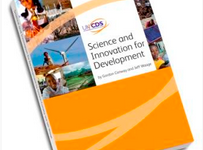Science and Innovation for Development is co-authored by Gordon Conway and Jeff Waage with Sara Delaney, published by UKCDS.
In Science and Innovation for Development, Conway and Waage take on the topic of the crucial role that science can play in the challenge of poverty reduction – with science acting as lever for change through both research and knowledge generation for policy guidance, and the development of innovative and appropriate technologies.
The authors make the following five key recommendations to policy makers and development practitioners:
- Train and empower scientists;
- Strengthen science innovation systems in developing countries;
- Ensure that new technologies are accessible to science for development;
- Design and deliver research for impact;
- Raise the profile of science in governments.
Science and Innovation for Development looks at the importance of national scientific capacity, the different sources from which new science and technologies can be drawn, and the ever-expanding role of partnerships between stakeholders.
The book uses the Millennium Development Goals as a framework, pulling out three key topics for which science plays an important role – reducing hunger, improving health, and achieving environmental sustainability. The authors highlight the current challenges in each area, look at how scientific innovation has helped thus far, and consider in what areas further research or new, improved technologies are needed. These ideas are illustrated through a broad range of case studies from across the developing world.
See a write-up of the launch by LIDC’s Guy Collender: ‘Academics Urge Governments to Listen to Scientists to Tackle Poverty in Poor Countries,’ and a review of the book in the journal The Lancet by Anthony Costello.







